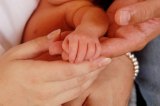Twenty years ago two baby girls were mixed up at a clinic in the French Riviera city of Cannes, southern France and ended up growing up in the wrong families.
On Tuesday, a court in the southern town of Grasse ordered the clinic at the centre of the mix-up to pay €1.88 million ($2.13 million) — six times less than the families had called for.
They had initially sued the hospital for €12 million, but in the end the court ordered €400,000 for each of the two children, €300,000 for each affected parent and €60,000 for each brother and sister.
…
The extraordinary story began on July 4th, 1994, when Sophie Serrano gave birth to Manon in the clinic in the Riviera city.
The infant was suffering from jaundice and was placed in an incubator equipped with special lights to treat the problem next to another little girl, Mélanie, who was suffering from the same condition.
But a hospital worker later returned the wrong babies to their respective parents, according to an inquiry that was conducted a decade later.
The mothers sensed something was wrong, and Mrs Serrano pointed out to hospital staff that her daughter had light skin but now appeared much darker.
Staff dismissed her concerns, saying that the difference was due to the effects of the lamps in the incubator.
But over the following years the doubts grew ever stronger. Manon Serrano was frequently teased in her village near Cannes about being the “postman’s daughter” because she did not resemble her father.
The father finally decided to get a paternity test done when she was ten. It proved that he was not her biological father. But the even bigger shock to the family was that it also proved that Sophie Serrano was not the child’s mother.
A subsequent inquiry established that the other girl had been growing up in another family just 30 kilometres away from the Serranos’ home.
…
The two families met but decided not to try to have the girls reunited with their biological parents because so much time had passed. Nor they did not remain in touch after their initial meetings.
Sophie Serrano explained: “I don’t see my biological daughter anymore. The social, educational and cultural differences (between the two families), added to the pain of our unconscious rivalry, took their toll on our relations.”
But she said that she “instinctively loved her biological daughter” from the moment she met her and that although she officially only has three children, “in my heart I have four”.
Manon (raised by Sophie, but not her biological daughter) – originally Mélanie – told the Nice-Matin newspaper that “They took my innocence away,”” They took away my dreams, my hopes, my desire to have children.”
Now, a wrong has clearly been done here. Manon and Mélanie may have decided to stay with the families they were brought up in (and who wouldn’t after 10 years), but any fair observer would have to conclude that they and their families were injured by the process.
But what kind of wrong was it? Both families were presumably very loving, and cared for the children well.
Clearly it was the breaking of the natural ties, although accidental, that was regarded as bad in itself and caused the families so much anguish. Manon and Mélanie were deprived of a relationship with their genetic parents because other adults (the hospital workers) made a mistake.
But would this be less bad if a similar thing happened because adults made a decision?
Let’s imagine another case – a girl very much like Manon Serrano is conceived through surrogacy and egg donation, and like Manon she finds out about her biological mother and “other family” at age 10.
This time, it would be her commissioning mother who would have chosen for her to be separated from her genetic one. The natural tie had been severed deliberately, not accidentally. Surely it’s clear a wrong, probably a greater wrong, has been done in this case? Wouldn’t she still have suffered a loss? Shouldn’t she still get a sympathetic hearing for her grief?
It’s interesting that the court paid out more money to the children than to the parents – this wasn’t just a wrong done to parents having their child taken away, but a wrong done to children denied a relationship with their natural parents. It’d be great if all those enthusiastically supporting surrogacy and egg and sperm donation would look at cases like this – and think again.
















